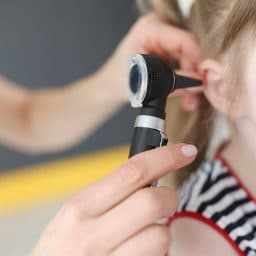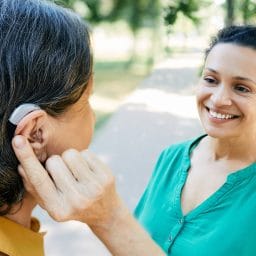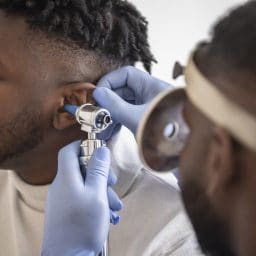Tips for Communicating with a Child Who Has Hearing Loss

According to the CDC, approximately one to three of every 1,000 babies is born with some degree of hearing loss. If your child or a child in your classroom has hearing loss, below are some tips to improve your communication with them. Create a Good Listening Environment At home, you can create a good listening…
Does Your Child Have Hearing Loss?

Newborn hearing screenings catch the majority of hearing loss in children. However, certain genetic conditions or progressive hearing loss might not show up in your child until later. Let’s examine some of the signs that may indicate your child is experiencing hearing loss so that you can get them the appropriate treatment as soon as…
How Does Hearing Loss Impact Learning in Young People?

A child with hearing loss may struggle to learn in ways that their peers with normal hearing will not. Whether you’re a concerned parent or a teacher at Eastgate Elementary School, it’s essential to be aware of these challenges as well as what signs to look out for. Speech and Language Problems Common with Hearing…
Have You had Trouble Pairing Your Hearing Aids on iOS?

If you recently updated your iPhone to iOS 15.4 and are now having trouble pairing your Bluetooth-enabled hearing aids to your device, you are not alone. Several manufacturers have noted the issue, which appears to originate with Apple. Thankfully, by following a few simple steps you should be able to reconnect. How to Pair Your…
How to Feel Confident When Wearing Hearing Aids

Wearing hearing aids can be an adjustment, both physically and socially. In order to maximize the benefits of your device, let’s discuss a few of the ways you can feel confident wearing your hearing aids in any situation. Hearing Aids and Social Stigma Unfortunately, many people are hesitant to use hearing aids because of the…
What is the Connection Between Neuroplasticity and Hearing Loss Treatment?

The human brain is incredibly adaptable to changes in its environment. Researchers have found that structural changes in the brain due to hearing loss may be reversed with the use of hearing aids. What is Neuroplasticity? Neuroplasticity refers to the brain’s ability to adapt by forming new neural connections throughout life. This can be in…
Can Hearing Aids Help with Balance Issues?

If your inner ears become damaged, it can affect more than just your hearing; it can impact your balance, too. This is because both the hearing and balance systems are housed within the inner ear. Fortunately, both hearing and balance problems have been shown to be treatable with hearing aids. How We Hear Within the…
When is a Cochlear Implant Necessary?

If you have moderate to severe hearing loss, you may be a candidate for a cochlear implant. Let’s examine what a cochlear implant is and how it can help people who struggle to hear, but who don’t benefit from traditional hearing aids. What are Cochlear Implants? Cochlear implants are small electronic devices that use an…
How Do Hearing Aids Help Manage Tinnitus Symptoms?

Tinnitus is a phantom ringing, roaring, whistling, hissing, humming or buzzing sound with no external sound source. Unless the underlying cause of tinnitus can be identified and treated, there is no cure for it. Fortunately, there are plenty of tinnitus management options, including wearing hearing aids. The Relationship Between Tinnitus & Hearing Loss According to…
ADHD & Hearing Loss in Children: What’s the Connection

Does your child have difficulty behaving and completing assignments at school? If so, you may want to have them screened for a potential learning disability like attention-deficit hyperactive disorder (ADHD) and also hearing loss. It’s common for one of these conditions to be mistaken for the other due to both sharing many symptoms. We review…